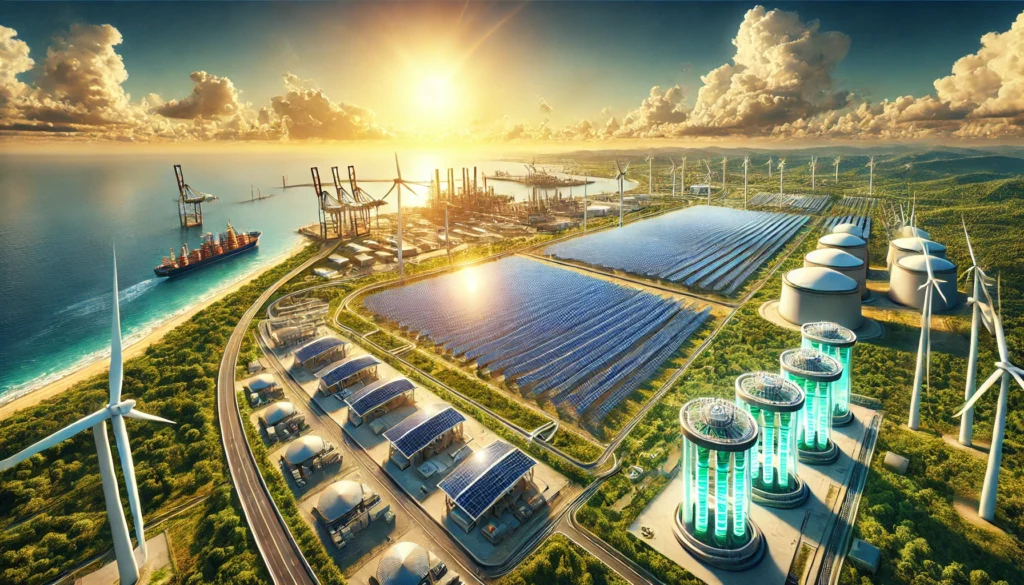The state of Andhra Pradesh introduces the ICE Policy 2024 to expedite the transition to clean energy systems within the state. Now the IE policy provides a comprehensive framework for developing clean energy projects, energy storage solutions, and initiatives for green hydrogen. The New and Renewable Energy Development Corporation of Andhra Pradesh (NREDCAP), in consultation with industry stakeholders, provided detailed implementation guidelines to ensure smooth implementation. This project will be carried out through the collaboration of various state entities, viz., APTRANSCO, APGENCO, APSPDCL, APEPDCL, APCPDCL, and Andhra Pradesh Solar Power Corporation Limited. Several state departments, such as Revenue, Industries, Water Resources, and Environment, have roles to play in making sure that required approvals are provided for stimulus development and project activities, all in conformity with steps taken in national solar or renewable energy initiatives under the aegis of the Ministry of New and Renewable Energy (MNRE) or the Ministry of Power, Government of India.
Andhra Pradesh as a Renewable Energy Leader
The ICE Policy 2024 project is designed to project Andhra Pradesh as a frontrunner in the National Scheme—the first step towards change in the energy sector of the country. Text and content reflectively echo the potential of solar power, wind, hydro, and energy storage with unbound strength. The principal objective lies behind inferring the very design of Andhra Pradesh being set up as an exclusive global hub for green hydrogen exports—from energy security to economic growth. In the same strain, the policy oscillates support to a wide spectrum of activities—from clean energy generation to renewable energy manufacturing, battery storage, and electric-propelled vehicle charging infrastructure. To further enhance the entire process of administration, a Unified/Single Desk Portal will soon be ready to allow developers to present their applications, followed by project tracking by generating a Unique Project Identification Number (UPIN) throughout departmental authentication. Quarterly status reports will be given to the Energy Department to enable them to keep a check on the approval process.
Approval Process and Project Categories
NREDCAP stands for the power to ratify small wind, solar, and hybrid projects followed by small hydro projects till 40 MW and 25 MW, respectively. Bigger projects, green hydrogen, biofuels, battery energy storage systems (BESS), and renewable energy manufacturing will have to pass through the State Investment Promotion Board (SIPC), State Investment Promotion Board (SIPB), and Government of Andhra Pradesh. Any BESS below INR 100 crore CAPEX will be administered by NREDCAP.
Land Allocation and Infrastructure Development
Land allocation for these projects will encompass government land/private land/forest land. While developers will independently fulfil prerequisites for their specific purchasing of private land, NREDCAP and district authorities retain the arm of government-assisted land allotment. NREDCAP, in tandem with responsible authorities on a proposal being done, has to provide clearance on an ad hoc basis for any projects requiring forest land, whereby all costs should be borne by developers. The priority of the state will be given to multiple, valuable projects, such as green hydrogen, RTC energy storage, hybrid co-located projects, and pumped storage plants. Furthermore, Renewable Energy Manufacturing Zones (REMZ) will be established near ports that help in developing solar PV, wind turbines, and batteries.
Lease Pricing for Clean Energy Projects
The policy also underscores the pricing of leases for varied clean energy sectors. Thus, a small general clean energy project will fetch a lease price of Rs 31,000 per acre per annum with a 5% rise every two years. Similarly, biofuel is planned at Rs 15,000 per acre per year with the same 5% increase every two years. For Green Hydrogen Hubs at Ports, the highest rate of Rs 100,000 per acre per annum is applicable.
Green Energy Open Access and Power Evacuation
Developers shall be responsible for expenses concerning interconnection metering, operations, maintenance, and testing under the Regulation of APERC (Green Energy Open Access) 2024. Power evacuation will be executed in coordination with the State Transmission Utility (STU). Developers may opt for Green Energy Open Access (GEOA) for different tenures—loans with indemnity: i) five years at a minimum, ii) not more than five years but up to one year—three kinds with respective processing fees charged at each summit level. Short-term applications will be processed by the Andhra Pradesh State Load Dispatch Centre (APSLDC); medium- and long-term applications will be processed by STU.
Conclusion: A Clear Path for Renewable Energy Growth
The ICE Policy 2024 provides an unfolded distinction and transparency in approval, land allotment, and power evacuation processes directed towards enhancing the green hydrogen, energy storage, and renewable energy manufacturing enterprise in the state. A certain measure of responsibility is vis-à-vis developers insofar as interconnection metering and the consequent processing fees for Green Energy Open Access. The energy banking will follow a monthly cycle with a prohibition on peak grid-demand regulations. The incentive thresholds require those interested to apply for the same through the Unified/Single Desk Portal, where the developer might enjoy benefits ranging from capital subvention, electricity cost reimbursement, duty exemptions, etc. The ICE Policy 2024 spells the highest order of quality when it comes to secure land, open access, and interconnection metering for the state of Andhra Pradesh to finally rise up on the national and global clean energy scene.

